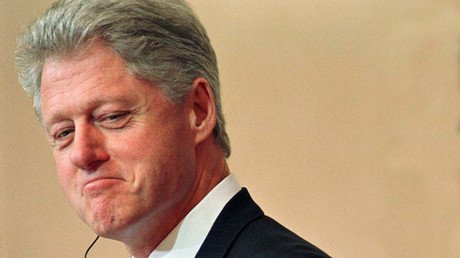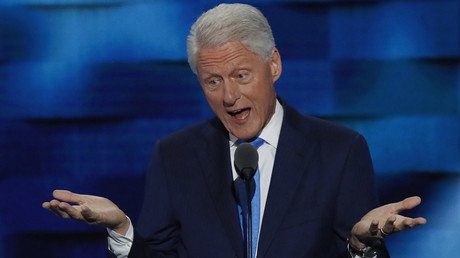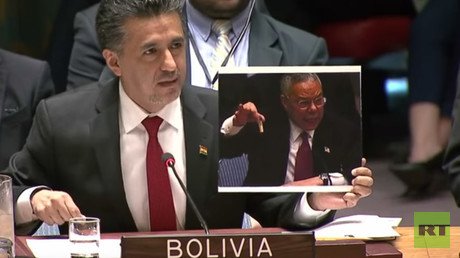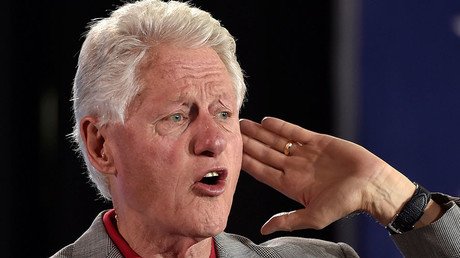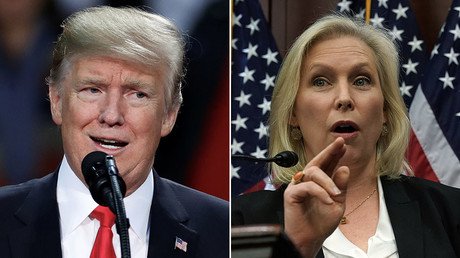‘Zippergate’ 20 years on: How Monica & Bill changed the course of world history
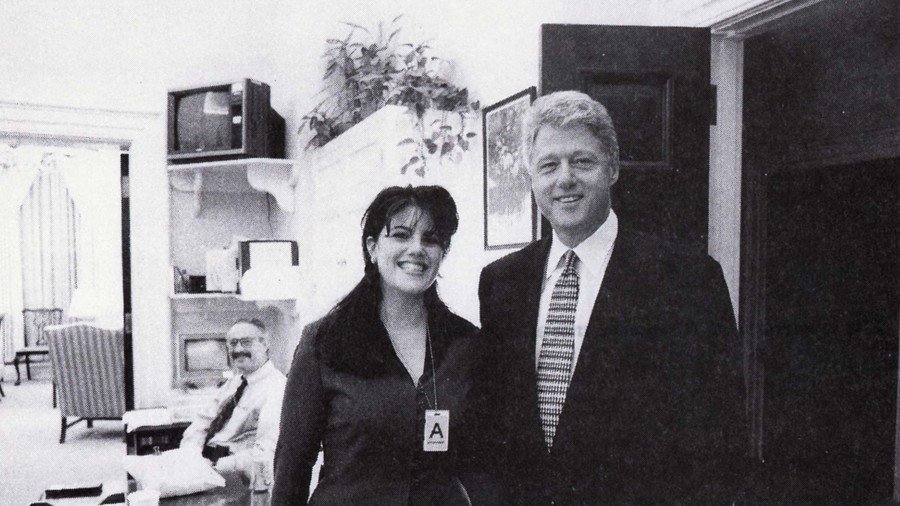
On the twentieth anniversary of the Clinton Lewinsky scandal, and just in time for the #MeToo coming out party, what better time to reflect on the political fallout from that hyper-sensationalized tryst.
In January 1998, Washington was reeling from rumors that then President Bill Clinton, 49, had been involved in a sexual relationship with 22-year-old White House intern Monica Lewinsky.
Despite repeated denials from Clinton, the media was not about to loosen its grip on such a salacious story.
On January 21, Clinton went on television with wife Hillary at his side to deny the reports, saying, “I want to say one thing to the American people. I want you to listen to me. I'm going to say this again: I did not have sexual relations with that woman, Miss Lewinsky.”
If Clinton thought that terse statement would put the media hounds off the scent, he was sadly mistaken.
Unknown to Clinton at the time, Lewinsky had been confiding her darkest state secrets to Linda Tripp, a woman Lewinsky befriended while the two of them were employed in the Pentagon’s public affairs office (bear with me, dear reader, these tedious details will end soon).
Tripp responded to poor Monica’s pleas for help like any true confidant would: She proceeded to break the law by taping her phone conversations with her young, impressionable friend, and then handed over the audio evidence to the lawyer Kenneth Starr. Thus began months of breathless speculation, with the media dragging out all the dirty details of the case with unabashed enthusiasm. In the course of the deliberations, for example, the world was made privy to the news that Monica had hid away in her closet a semen-stained blue dress; Tripp, who was allegedly taking advice from the literary agent, Lucianne Goldberg, advised Lewinsky not to seek the services of a dry cleaner. Tripp then delivered this incriminating article of clothing to Starr, along with the tapes. Which begs the question: With friends like this, who needs enemies?
The world was also forced to ponder, along with the prosecution, some very embarrassing questions. For example, does oral sex constitute bona fide, skin-slapping sex? Or does it belong in an entirely different category? Needless to say, this was not America’s finest hour on the global stage. It was due to this apparent confusion over simple semantics that led Clinton to deny that he had any sexual relations with Miss Lewinsky. This slick denial opened up the president to charges of perjury, which set in motion impeachment proceedings against him.
And then the fireworks really began. On August 20, in true ‘Wag the Dog’ fashion, Clinton ordered the bombing of a pharmaceutical plant in Sudan that produced aspirin. Yes, aspirin. Apparently the strategy here was to ensure that the wily Osama bin Laden and his Al-Qaeda network would be deprived of headache relief.
Whatever the case may be, the timing of the attack – on the very day of Lewinsky’s return to the grand jury trial – was suspicious to say the least. “Sources in US intelligence apparently claimed that there was only one ‘window’ through which to strike at bin Laden, and that the only time… Was on the night of Monica Lewinsky's return to the grand jury,” the late Christopher Hitchens wrote in Salon.
However, there were far greater global implications of the Clinton-Lewinsky case than just the destruction of a pill factory in Sudan, bad as that was. In fact, the short-lived tryst between Clinton and Lewinsky could have actually changed the course of world history.
Let’s assume that the Clinton-Lewinsky thing never happened. Who would have benefited most from such a magical historical revisionism? Yes, you guessed. Vice President Al Gore, who many analysts believe would have been an easy shoe-in for the presidency if not for Zippergate. After his defeat in the 2000 presidential election against George W. Bush, Gore said the Clinton scandal had placed a “drag” on his campaign.
And considering how Bush won the extremely tight election, which went down to a vote determined not by the people, but by a 5-4 vote in the Supreme Court, it seems safe to say that Gore would most likely have defeated Bush had the Clinton affair not muddied the political waters.
Thus, America, by default, got arguably the worst president in American history at a time when it would demand nothing less than the best. That’s because in just nine months’ time, the United States would be attacked by 19 Al-Qaeda terrorists who would strike at the heart of America’s business and military centers, killing some 3,000 people in the process.
Although it is unlikely that Gore could have prevented the attacks from happening had he been president, we can speculate that his response to the attacks would have been radically different than Bush’s. Perhaps one of the greatest tragedies of modern American foreign policy was the decision to attack Iraq in March 2003. By now, we are all too familiar with the bit of theater then Secretary of State Colin Powell delivered at the UN General Assembly, as he shook a vial of faux anthrax, suggesting that Saddam Hussein possessed enough of the deadly bacteria to wreak havoc.
Powell, whose testimony was later determined to have been built on “bad intelligence,” says his UN speech would be a permanent “blot” on his record. Nevertheless, it succeeded in doing what so many hawks in the Bush administration had been advocating for a long time: provide a premise for launching an attack against Iraq.
The UK under Tony Blair backed up the bad intelligence, saying Hussein's chemical weapons were on "standby" to use within 45 minutes. That claim also turned out to be false.
Needless to say, that illicit war will forever stain the reputation of the United States. The Bush administration - despite protests from UN weapons inspectors on the ground in Iraq, who reported they were unable to find any evidence pointing to the existence of weapons of mass destruction in the country - went ahead and opened its military offensive anyways.
"There were about 700 inspections, and in no case did we find weapons of mass destruction,"said Hans Blix, the Swedish diplomat who served as UN chief weapons inspector from 2000 to 2003.
Today, Iraq continues to suffer deaths as a direct result of America’s decision. According to the Iraq Body Count website, between 180,093 to 201,873 civilians were killed as a result of that conflict.
Meanwhile, and equally disturbing, is that the Iraq war gave rise to one of the most heinous terrorist organizations in history: Islamic State. Although there is no guarantee that Gore would not have taken the same steps as George W. Bush had he been president, it seems likely, given what we know about the neoconservatives that were prevalent in the Bush administration, there would have been no such course of action against a country totally unconnected to the attacks of 9/11 and weapons of mass destruction.
That should serve as a reminder to any future leader – male or female – who may happen to be tempted by the charms of a fellow colleague. The potential far-reaching consequences of such a dalliance are just not worth it.
@Robert_Bridge
The statements, views and opinions expressed in this column are solely those of the author and do not necessarily represent those of RT.

